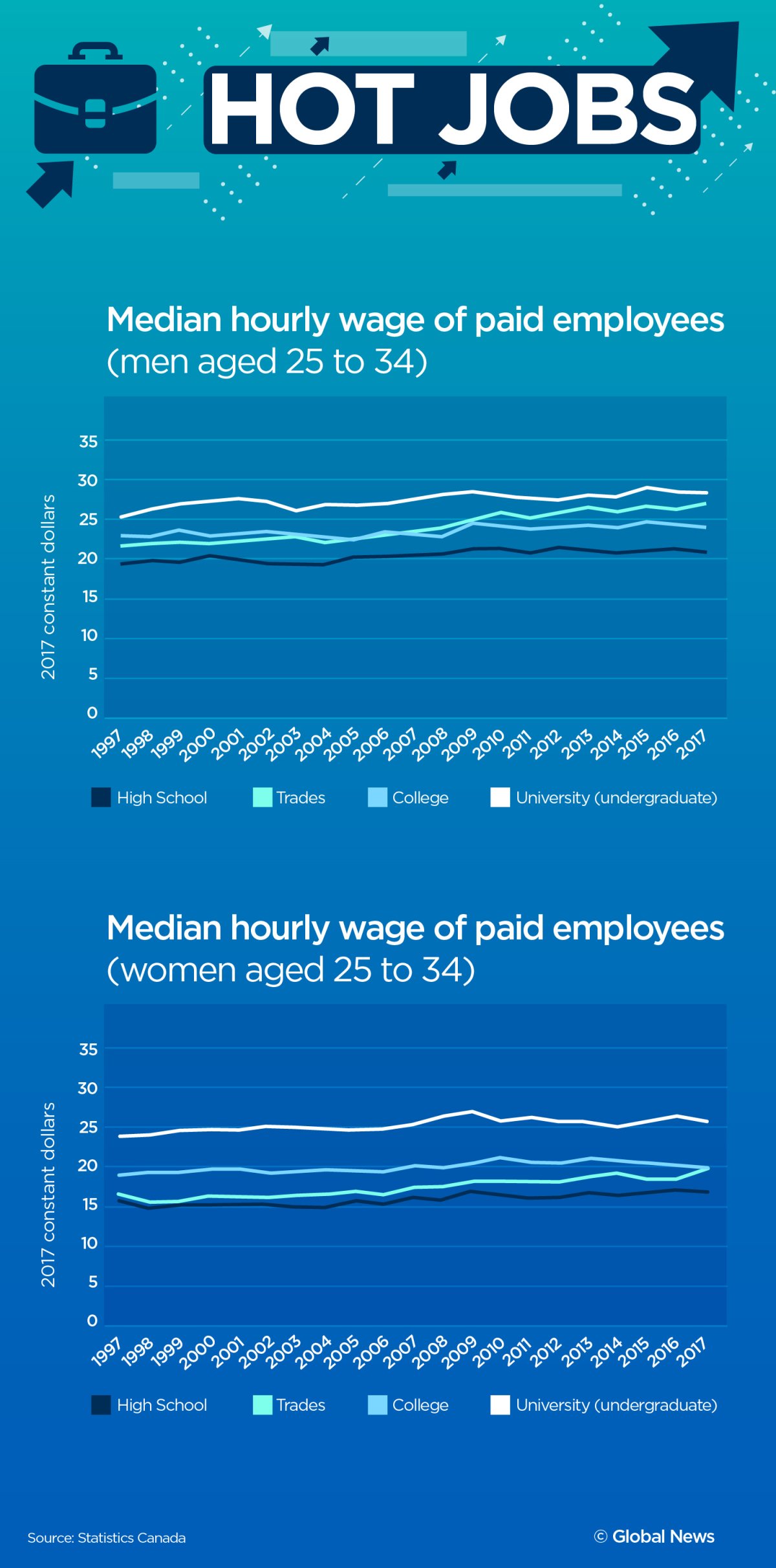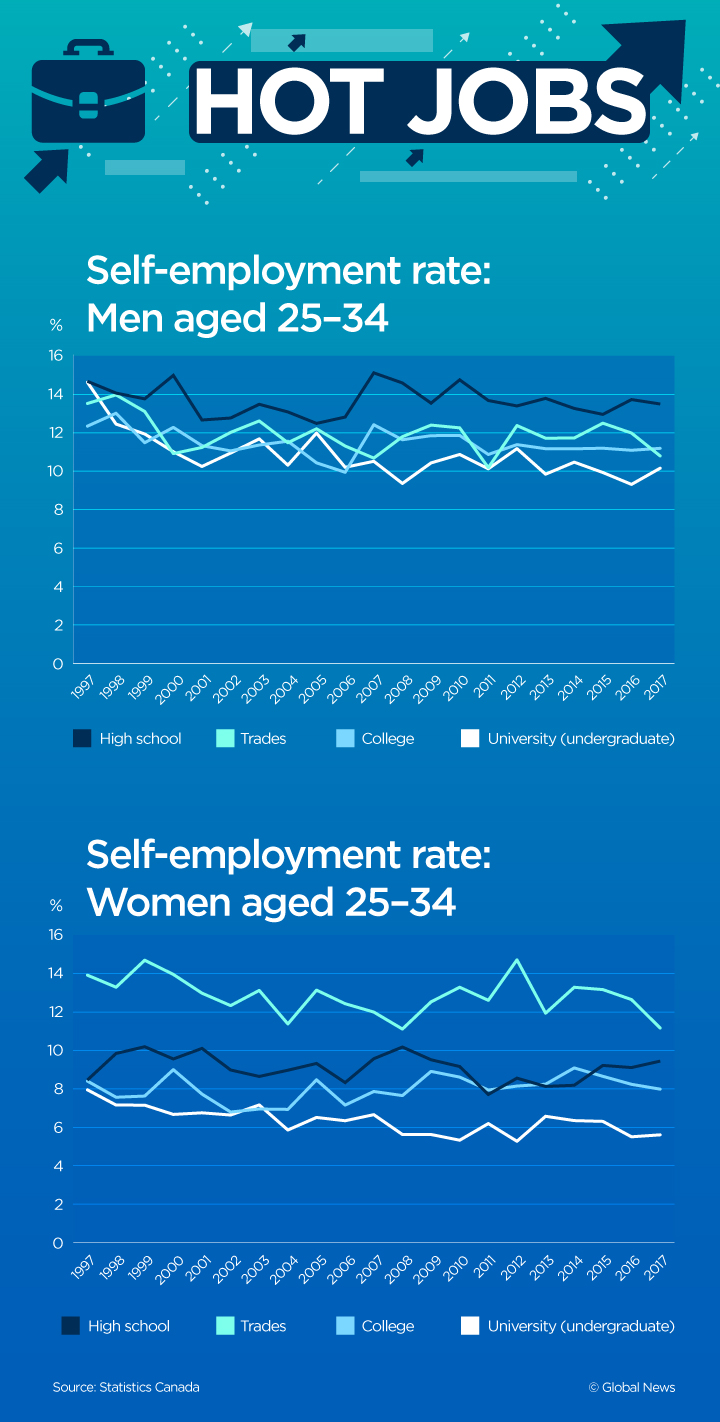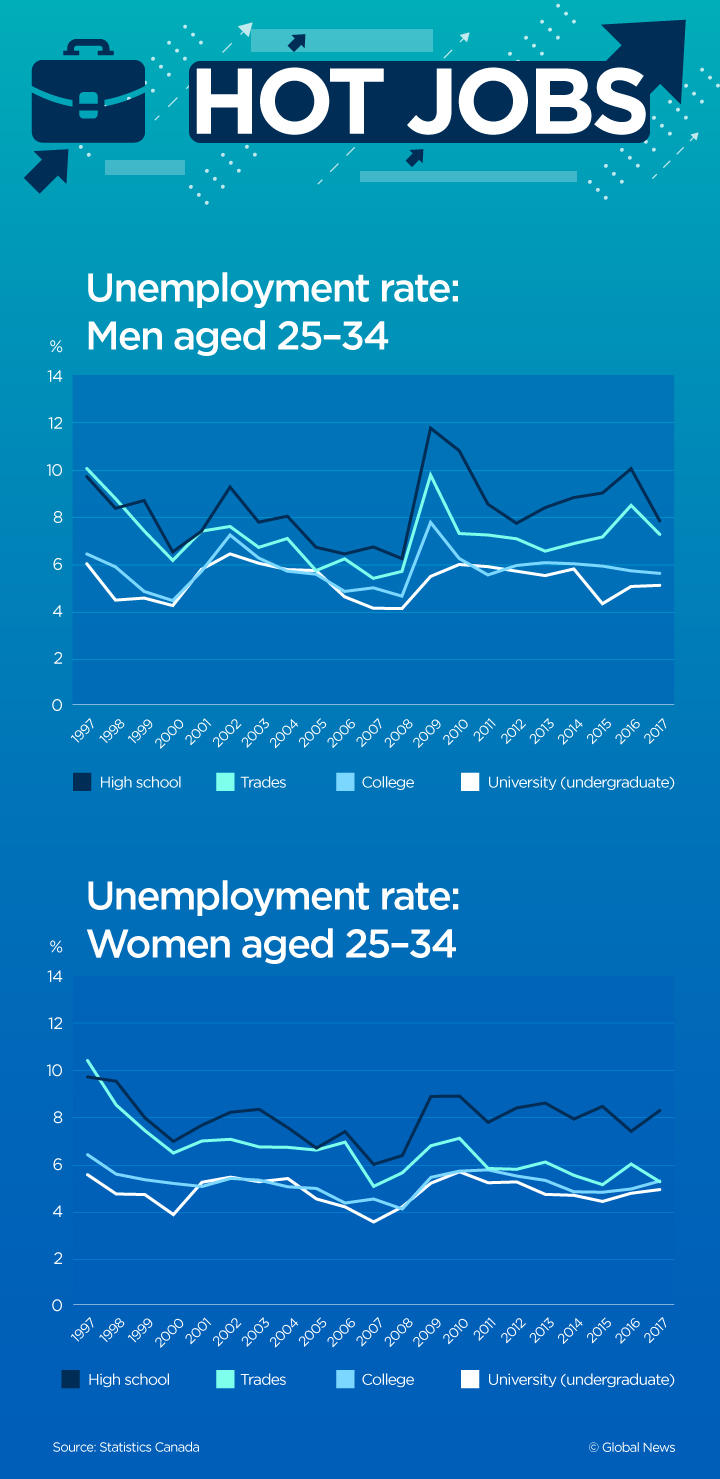Whether you’re figuring out your first career path or looking to change directions, a new series from Global News, Hot Jobs, focuses on career strategy for a new era in work.

If anything seems certain for high school graduates these days, it’s that the cost of university will keep going up. The average annual undergraduate tuition fee climbed again this year — to $6,838 — as it has done for 29 years in a row now.
Parents and students tend to regard the expense, and the debt that often results from it, as the price one must pay for access to well-paying jobs and a chance to move up in the world.
But is a university degree the only ticket to a good salary and a line of work that might turn into a career?
READ MORE: Hot Jobs — the $100K entry-level job you can get here in Canada
Overall, university graduates remain the top earners. The mid-range annual salary for degree holders working full time was around $68,600 in 2015, compared with $52,300 for those with a college diploma and $42,700 for those with a trades certificate or apprenticeship training, data from the 2016 census shows.
Women with a university education typically earn 40 per cent more than those with a college diploma and 79 per cent more than those with an apprenticeship certificate, according to Statistics Canada. For men, the earnings advantage is 21 per cent compared with college and 12.5 per cent compared with a skilled trades education.
READ MORE: Here are the jobs with the highest — and lowest — wage growth in Canada
But the wage growth of university grads has been less than stellar, particularly for men. Men with a university degree saw their earnings grow a mere six per cent between 2005 and 2015, compared to eight per cent for their college-educated peers and 14 per cent for those in the trades. And men with apprenticeship training were making nearly $73,000 a year in 2015, seven per cent more than those with college diplomas ($68,000). In Saskatchewan, they managed to out-earn even bachelor degree holders, bringing home around $86,000 a year compared to $84,000 a year for those with a degree.
Young men with a trades certificate now earn more than those with a college diploma, while young women with a trades education are now earning almost as much as those who went to college.
Some make well into the six figures. For example, instrumentation technicians — who are in charge of installing and maintaining the measuring and control instruments used in manufacturing, petrochemical and other commercial settings — were making an average of $130,000 a year, the highest-paid trade in Canada.
And yet, economists warn that only time will tell whether those stellar earnings will hold up for the next 10 or 20 years.
WATCH: An interview for highly-paid tech jobs often involves brainteasers. Here’s how you should answer

Why do some skilled trades jobs pay so much?
Working in the trades wasn’t always this lucrative. The numbers show that stronger earnings growth started in the mid-2000s, coinciding with the onset of the oil and gas boom in Alberta, Saskatchewan and Newfoundland and Labrador, as well as the real estate craze in Vancouver and Toronto.
While the demand for people like lineworkers, electricians and carpenters skyrocketed, the share of Canadians with the skills to fill those jobs ticked up just a tad, from 4.9 per cent in 2006 to 7.8 per cent in 2016. As a result, pay went up quickly.
Data provided by Statistics Canada to Global News also shows that the wages of workers in the trades decline neither during the 2008-2009 financial crisis nor during the 2014-2016 recession in the oil patch.
“Wages tend to be ‘sticky’ downwards — i.e. they don’t often fall,” Marc Frenette, of the Social Analysis and Modelling Division at StatCan told Global News.
In general, it’s easier to let people go or reduce their hours than to trim their pay.
WATCH: Public- vs. private-sector jobs — here’s how pay compares

No student debt, no lost earnings

Get weekly money news
The ability to get an education without paying for it is what got Koady Morris of Coldwater, Ont., into the trades.
When he graduated from high school, the now 25-year-old tried to get into college to become a paramedic but failed a required entry test. Catching up would have required taking around $3,000 worth of pre-health classes, which he ultimately thought wasn’t worth it, he said. Instead, he started working as a general labourer at a local construction company making $16 an hour.
The following year, he looked into becoming a firefighter but balked at spending around $16,000 in pre-service college programs.
READ MORE: Want a job that pays $75K-$100K? Few do, amid Canada’s worst labour shortage in 10 years
Instead, he kept working in construction and started training to become an electrician. It took him four years to earn a Certificate of Qualification, but that included 9,000 hours of apprenticeship, where he was learning on the job — and getting paid. And during the periods when he was in school, Morris said he could count on the government’s Employment Insurance program for Canadians attending full-time technical training, as well as $2,000 worth of apprenticeship grants for the first two years.
“You’re getting paid all the time,” he said.
Instead of shelling out money for his education, Morris was making between $30,000 and $40,000 a year while earning his qualification. When going out for a beer with his peers who were in school, he joked, “I paid for pretty much everyone.”
WATCH: Seven jobs that let you travel the world

Plenty of room to move up
In his first year as a certified electrician at age 24, Morris said he made $56,000. He also moved over to “the business side of things,” with a job at a temporary power distribution company that involves both designing electrical systems and handling sales.
His employer was looking for an electrician to train as a business associate, and he was eager to learn.
“There’s clearly room to move up,” he said.
READ MORE: ‘Odd Jobs’ — from tasting chocolate to rebuilding dinosaurs
Nany Cote of Randstad Canada, one of the country’s largest staffing agencies, offered a similar assessment.
According to Randstad, which focuses on the manufacturing sector, warehousing, call centres and administrative jobs, several of the best-paying positions that don’t require a university degree are usually filled with internal recruits.
“Some of these are the kinds of jobs you grow into from within the organization,” Cote said.
READ MORE: Canada’s 10 most in-demand jobs for 2018 and their salaries, according to Randstad
That’s the case of production managers, who typically earn $85,000 in their first year on the job and close to $100,000 five years into it. The gig involves overseeing production on the factory floor, and it usually takes five to 10 years to get there, depending on the size of the employer, Cote said. The same is true for logistics managers, who have the second best-paying job in the Randstad dataset, with median earnings of $65,000 in the first year and over $77,000 after five years.
In general, “the more education you have, the better,” Cote said.
In the current tight labour market, however, employers are increasingly willing to train employees themselves or pay for them to go back to school.
WATCH: These jobs are safe from robots, according to one economist

Few women in the high-paying skilled trades jobs
Trades jobs have benefited men much more than women.
If you’re a woman, the numbers suggest that a university education is likely to be your best shot. Data from the 2016 Census shows that the average woman with a bachelor’s degree earned around $68,300 in 2015, 41 per cent more than those with a college diploma ($48,600) and nearly 80 per cent higher than those with an apprenticeship certificate ($38,200).
The main reason for this is that women tend to work in trades jobs that have little to do with the oil and gas sector or housing. In 2015, for example, three in 10 had certificates in hairstyling.
“There is a perception — which unfortunately had been well-earned historically — that the industrial skilled trades culture has not been welcoming to women,” said Sean Reid of the Progressive Contractors Association of Canada, an advocacy group representing unionized construction employers.
And although the industry has made significant inroads in addressing that, there are still instances where pin-up girl desk calendars are a feature of the workplace, he added.
“That’s out of the mainstream of the industry now,” he said. But the stereotype “still casts a long shadow.”
In general, many women continue to think they don’t have what it takes for these jobs, said Annastacia Plaskos of Toronto-based Fix It Females, a team of mostly female home renovators.
In reality, though, women are perfectly able to carry out even the most demanding physical tasks, she said.
“I have people on my team who weigh 100 pounds soaking wet and they can lift more than I can.”
Still, as women continued, for the most part, to avoid the industrial skilled trades over the past decade, the housing and resource booms failed to lift their earnings.
READ MORE: Here are the jobs with the highest — and lowest — wage growth in Canada
Men working in the trades may also have unions to thank for their hefty and sticky wages. Of those aged between 25 and 34, some 36 per cent belong to a union or work in a job regulated by a collective bargaining agreement. That compares to 30 per cent among college graduates, 24 per cent among high school graduates, and 22 per cent among degree holders. For older men in the skilled trades (ages 35 to 54) the unionization rate is even higher, at nearly 40 per cent.
Women with apprenticeship training, on the other hand, are less likely to belong to a union and more likely to be self-employed, according to the StatCan data.
Will the big paycheques last?
The Canadian economy is growing at a healthy clip, but that won’t last forever. And when things turn south, data shows that more years of schooling tend to pay off.
While wages in the trades did not budge during Canada’s two most recent recessions, the unemployment rate shot up, StatCan data provided to Global News shows. In the 2008-2009 recession, the jobless rate among young men with apprenticeship training reached 9.8 per cent, compared with 7.7 per cent among diploma holders and 5.4 per cent for university graduates. (Women working in the trades didn’t see as much of a spike in their jobless rate, although they, too, were hit harder compared to women with a college or university education). The same pattern is evident after the 2014-2016 recession in Alberta, although the impact then was more muted, possibly because the persistent boom in Vancouver and Toronto’s real estate market helped soften the blow.
But as oil prices remain subdued and rising interest rates limit Canadians’ ability to buy bigger houses and bankroll home renovations, it’s unclear what the future holds for skilled trades jobs.
“It remains to be seen what will happen to the wages of today’s young trades graduates in the years to come,” StatCan’s Frenette said via email.
READ MORE: Union outcry as automation eats up 400 oilsands jobs — and it’s just the beginning
If you look at education like an investment in the future, apprenticeships in the industrial skilled trades have yielded great returns for over a decade. Their cost — in terms of school fees and time spent in a classroom instead of out in the field being paid — is low. The payback — a relatively straightforward path to well-paying jobs — has been high.
WATCH: Here are jobs that can be done remotely and pay more than $50,000 per year

The question is how long those high returns will hold up.
In the U.S., for example, the subprime mortgage crisis of 2007 led to a “big and lasting collapse” of the construction industry, said Thomas Lemieux, a labour economist at the University of British Columbia.
University, by contrast, has a long track record of yielding high returns.
READ MORE: Amazon opens automated supermarket, spelling doom for retail cashiers
The proceeds of a university education have become “much more stable” in the last 10 to 15 years, with slower wage growth for degree holders, Lemieux said. But this came after a huge increase in the supply of university graduates, which was, in part, due to greater and greater numbers of women joining the labour force and reaching higher levels of education.
The fact that returns on education slowed down instead of dropping hints at a strong and enduring demand for university grads, according to Lemieux.
“Long-term, a university is still probably a better investment,” he said.
As for Morris, the electrician, his long-term plan is to go back to school — this time to earn a bachelor of commerce in finance.
He has no regrets, though, about his path so far. A career in the trades, he said, is something he would strongly recommend to anyone.
As a certified electrician, “within five to 10 years, you can make $100,000 a year — easy.”
And once you’re an electrician, you have those skills forever.
“It’s a great thing to fall back onto.”












Comments